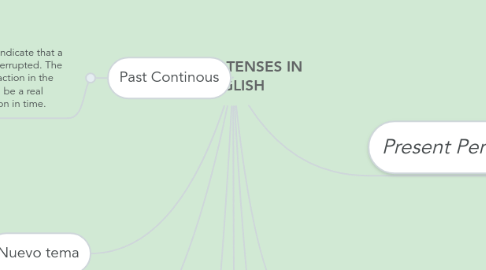
1. Nuevo tema
1.1. Will
1.1.1. We use will to respond to someone else's complaint or request for help. We also use "will" when we request that someone help us or volunteer to do something for us. Similarly, we use "will not" or "won't" when we refuse to voluntarily do something.
1.1.1.1. Form
1.1.1.1.1. Affirmative
1.1.1.1.2. Negative
1.1.1.1.3. Question
2. Nuevo tema
2.1. Simple Past
2.1.1. We use Simple Past to express the idea that an action started and finished at a specific time in the past. Sometimes, the speaker may not actually mention the specific time, but they do have one specific time in mind.
2.1.1.1. Form
2.1.1.1.1. Afirmattive
2.1.1.1.2. Negative
2.1.1.1.3. Subject + didn't / did not + Verb simple form + Complement
2.1.1.1.4. Question
2.1.2. Nuevo tema
3. Nuevo tema
3.1. Simple Present
3.1.1. We use Simple Present to express the idea that an action is repeated or usual. The action can be a habit, a hobby, a daily event, a scheduled event or something that often happens. It can also be something a person often forgets or usually does not do.
3.1.1.1. Form
3.1.1.1.1. Afirmattive
3.1.1.1.2. Negative
3.1.1.1.3. Question
3.1.2. Nuevo tema
4. Past Continous
4.1. We use the Past Continuous to indicate that a longer action in the past was interrupted. The interruption is usually a shorter action in the Simple Past. Remember this can be a real interruption or just an interruption in time.
4.1.1. Form
4.1.1.1. Question
4.1.1.1.1. Was/ were + subject + Present Participle + Complement + ?
4.1.1.2. Negative
4.1.2. Nuevo tema
5. Present Perfect
5.1. We use Present Perfect to say that an action happened at an unspecified time before now. The exact time is not important. We CAN use the Present Perfect with unspecific expressions such as: ever, never, once, many times, several times, before, so far, already, yet, etc.
5.1.1. Form
5.1.1.1. Afirmattive
5.1.1.1.1. Subject + have/has + Verb in past + Complement + Expressions of time
5.1.1.2. Negative
5.1.1.2.1. Subject + have not/has not + Verb in past + Complement + Expressions of time
5.1.1.3. Question
5.1.1.3.1. Have/has + Subject + Verb in past + Complement + Expressions of time + ?
6. Nuevo tema
6.1. Past Continuous
6.1.1. We use the Past Continuous to indicate that a longer action in the past was interrupted. The interruption is usually a shorter action in the Simple Past. Remember this can be a real interruption or just an interruption in time.
6.1.1.1. Form
6.1.1.1.1. Question
6.1.1.1.2. Negative
6.1.2. Affirmative
6.1.2.1. Subject + was/were + (Verb+ing) + Subject + When/while + Complement
6.1.2.1.1. I was reading a book when Juan knocked the door
7. Nuevo tema
7.1. Present Continuous
7.1.1. We use Present Continuous with Normal Verbs to express the idea that something is happening now, at this very moment. It can also be used to show that something is not happening now.
7.1.1.1. Form
7.1.1.1.1. Afirmattive
7.1.1.1.2. Negative
7.1.1.1.3. Question
